
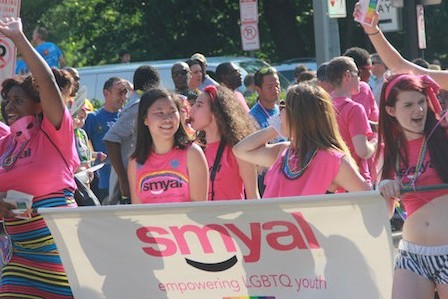
Despite being all the craze, you may not know that the 2014 FIFA World Cup is a soccer (or football, depending on where you live) tournament that hosts 32 teams from around the world—all ready to prove their prowess and strength in a demonstration that encourages and promotes a sense of superior nationalism. This year’s official song is “Ole! Ola! We Are One”. It’s a lovely message of unity and power; however, one presence is severely lacking in this event—openly gay players. Where do “we” fit in at this world-wide sports event?
Rumors are currently circulating about potential controversy and homophobia predicted at subsequent World Cups in 2018 and 2022, which will be held in countries that are outwardly discriminatory against LGBTQ persons. Although the United States has seen an emergence of out-of-the-closet players on the collegiate level, male professional sports still have a hold on secrecy. There is good news however: companies, countries and people alike are finding ways to show their support for the LGBTQ community and their contributions to sports. Behold the good and the bad surrounding the 2014 World Cup Tournament:
1. #ProudtoPlay
In the beginning of June, YouTube & Google launched their pride campaign with a focus on sports. This is huge news considering these are the two top trafficked websites in the world. Partly inspired by the Sochi Olympics and the recent NFL draft, the companies have made sports a priority and will be highlighting not only this video, but a rainbow soccer ball as their logo. With a growing global conversation about the inclusion of LGBT players in sports, #ProudtoPlay highlights out-players and allies to bring together the entire community.
2. Sergio K
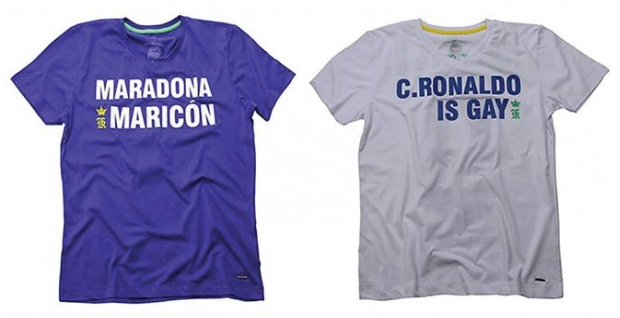
Sports competitions are typically full of hateful slurs designed to unify the fans of one team while intimidating and pushing away their opponents. About two months before the beginning of the World Cup, a Brazilian apparel company, Sergio K, began selling t-shirts that poke fun of other players. While most of the shirts use common phrases like, “loser” directed toward Mario Balotelli, the two pictured above are the most offensive. The owner of the company denied being homophobic and considered the shirts to be “inoffensive”—a way for fans to show support without wearing uniforms. Unfortunately, even with boycotts by LGBTQ rights groups in Brazil, the company maintains that they sold out of the shirts.
3. Stonewall and Football Addicts polling for the Future
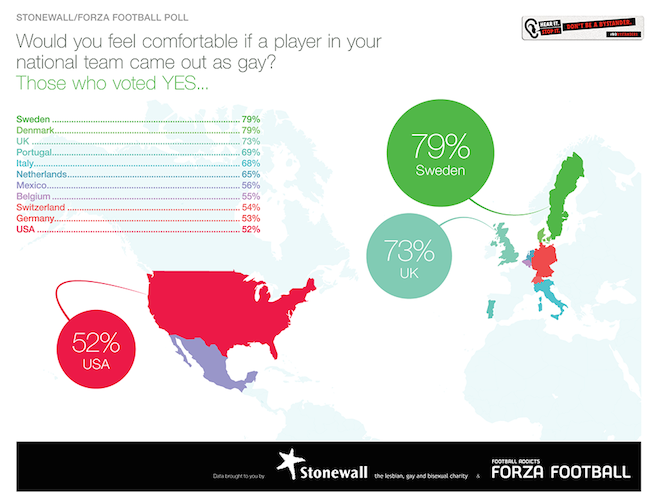
Serio K may have sold out of their demeaning shirts, but elsewhere things are looking much better. Stonewall, England’s leading gay lobbying organization and Football Addicts took to the streets to poll the opinions of 30,000 soccer fans about whether their countries would support openly gay players. In recent years, there have been a few players to come out while on teams, including Anton Hysén (Sweden) and Robbie Rogers (USA), though neither are participating in the World Cup. Rogers in particular has helped others navigate how to come out in professional sports including advising Jason Collins, the first openly gay basketball player, on how to handle the media. While their presence has been an inspiration to other professionals as well as amateurs, there is still concern with the general population. With Nigeria and Ghana being the least accepting of LGBTQ rights, many countries across Europe and the United States have shown majority support for the out players representing their respective countries and this data offers insight that may bring about more visibility.
4. United Nations Calls on Players to Come Out
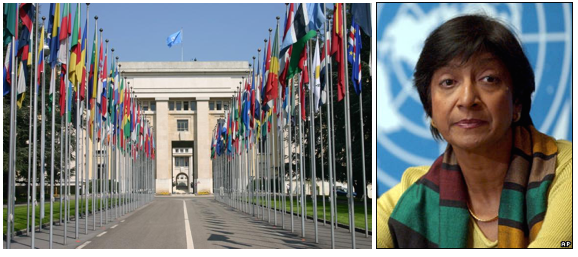
On June 16, 2014 the United Nations Human Rights Commissioner, Navi Pillay, called on gay soccer players to declare their sexuality in an effort to help all LGBTQ people be accepted around the world. “That’s the only way they will find the right to sexual orientation accepted. They are role models, it’s important to send this message to their fans as well,” Pillay said, adding that it was “a shame, in this day and age”, that people “had to hide who they really are.” In addition, she also warned governments that are bidding for sporting events to consider the impacts the events would have on human rights. In the spirit of Mandela, she maintained that, “Sporting events should celebrate the joy of human potential, not generate pain and abuse.”
5. The 2018 & 2022 World Cup
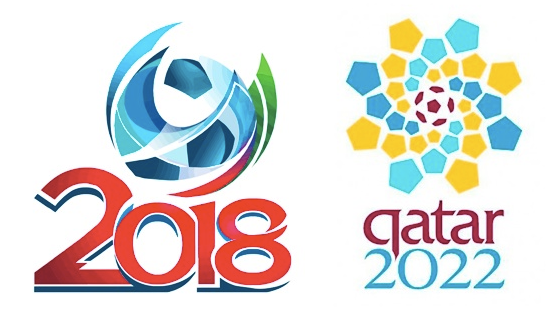
This year’s World Cup is an exciting event across the globe though it has not been without its problems. Aside from not hosting any openly gay players, Brazil has been subject to criticism for it’s human rights violations including the forced evacuations of communities, suppression of the rights of students and the elderly, and police abuse committed in the name of security. There is also much concern regarding the future venues for the 2018 and 2022 events. The world watched the controversy unfold from the Sochi Olympics as Russia instituted anti-gay laws, which is exactly where the 2018 FIFA World Cup will be held. Qatar, the host of the 2022 tournament, currently has even harsher laws against homosexuality for citizens and foreigners alike, including seven years of imprisonment or, as an alternative, flogging.
While we take this competition as an opportunity to commune, to celebrate our collective nationalities and cheer on our teams as they advance, it is important to truly embrace the official message of the 2014 FIFA World Cup that we are one. Regardless of race, ethnicity, class, gender, or sexual orientation, human rights should stand above all else in our daily lives and on the global level. May we all embrace this message as we watch the games unfold and wish good luck to all the countries participating.